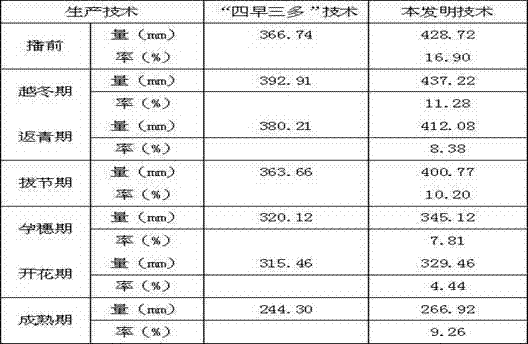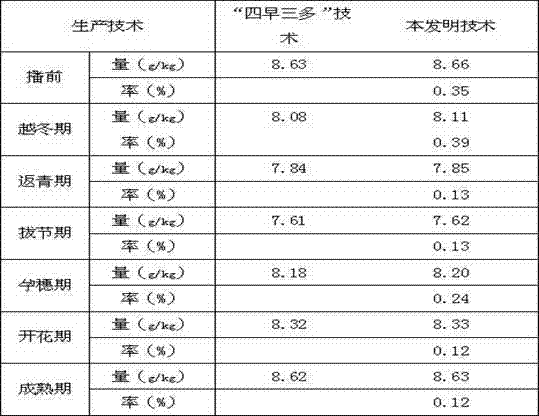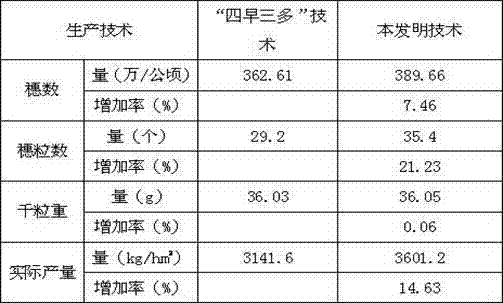Rainwater-collecting, water-storing and drought-resisting method for fallow period of one-cropping-one-year dryland wheat zone
A technology in the fallow period and wheat area, which is applied in the field of crop farming, can solve the problems such as the failure to increase organic matter, the failure to meet the needs of the rainy spring, and the weakening of farmland manpower input, so as to increase the protein content, improve the soil water storage, The effect of improving the quality of wheat
Inactive Publication Date: 2012-11-21
SHANXI AGRI UNIV
View PDF1 Cites 1 Cited by
- Summary
- Abstract
- Description
- Claims
- Application Information
AI Technical Summary
Problems solved by technology
The main problems in dryland wheat production are: low input of organic fertilizer, low soil fertility, low water storage and water retention capacity of the soil, resulting in low water use efficiency; late return of straw to the field, unable to rot in time, and unable to achieve the effect of increasing organic matter in the current season At the same time, it affects the quality of sowing; although the fallow period has relatively more rainfall, accounting for more than 60% of the annual rainfall, the summer temperature is high, and the evaporation loss of surface water is large, which cannot achieve the purpose of summer rain in spring; dryland wheat is basically Planting while taking advantage of moisture or waiting for rain, so the planting time is early or late, premature planting before winter, and planting too late are small and weak almost every year
However, after entering the 21st century, the new situation of "two strong and one weak" in crop production has been strengthened in material energy input, strengthened in agricultural machinery operation hardware, and weakened in farmland human input. Due to changes in rural labor force and agricultural mechanization, "four early three "The popularization and application of water storage and moisture conservation technology is facing severe challenges
Method used
the structure of the environmentally friendly knitted fabric provided by the present invention; figure 2 Flow chart of the yarn wrapping machine for environmentally friendly knitted fabrics and storage devices; image 3 Is the parameter map of the yarn covering machine
View moreImage
Smart Image Click on the blue labels to locate them in the text.
Smart ImageViewing Examples
Examples
Experimental program
Comparison scheme
Effect test
Embodiment 1
the structure of the environmentally friendly knitted fabric provided by the present invention; figure 2 Flow chart of the yarn wrapping machine for environmentally friendly knitted fabrics and storage devices; image 3 Is the parameter map of the yarn covering machine
Login to View More PUM
 Login to View More
Login to View More Abstract
The invention discloses a rainwater-collecting, water-storing and drought-resisting method for a fallow period of one-cropping-one-year dryland wheat zone. The method comprises the following steps: after former wheat cropping, deeply scarifying soil by using a deeply-scarifying and fertilizing integrated machine on rainy days in the first ten days and the middle ten days of July; deeply applying organic fertilizer while deeply scarifying; covering the deeply scarified land surface by straws; and performing rotary tillage, harrowing, leveling and collecting water, and chemically weeding once when necessary in the first ten days and the middle ten days of August. Compared with the prior art, by the method, soil water retention with the amount of 0-300cm can be increased before sowing winter wheat and the organic fertility of the soil can be improved; the method is simple in technical operation, high in practicality and obvious in water retention; tillage, fertilization and straw return are integrated, so that agricultural machinery and agronomy are organically combined, tillage, water retention, fertilization and water storage are coordinated, and thus aims of deeply storing middle-summer rainwater and utilizing the rainwater in other seasons are achieved; the method is widely applicable to loess plateau dryland wheat zones; and compared with the conventional tilling technology, by the method, the yield of wheat can be improved by about 15 percent under perennial production conditions.
Description
technical field [0001] The invention relates to the technical field of crop cultivation, in particular to a method for receiving rain, storing moisture and preventing drought suitable for the fallow period in dryland wheat areas once a year. Background technique Drought and water shortage are one of the key factors limiting the yield of dryland wheat. For a long time, dry farming mainly adopts mulching and other seeding methods to reduce runoff and ineffective evaporation of water, improve soil water retention capacity and soil moisture, and ultimately increase yield. However, the only source of water for dryland wheat is natural rainfall, and the rainfall in the dryland wheat region of the Loess Plateau is basically concentrated in July-September, which is the fallow period of the dryland wheat region. This period is the replenishment and recovery period of soil moisture. The amount of water determines the amount of moisture in dryland wheat before sowing, and is an impor...
Claims
the structure of the environmentally friendly knitted fabric provided by the present invention; figure 2 Flow chart of the yarn wrapping machine for environmentally friendly knitted fabrics and storage devices; image 3 Is the parameter map of the yarn covering machine
Login to View More Application Information
Patent Timeline
 Login to View More
Login to View More IPC IPC(8): A01B79/02
Inventor 陆梅赵维峰杨珍平李青邓妍李光刘庆建高志强
Owner SHANXI AGRI UNIV
Features
- R&D
- Intellectual Property
- Life Sciences
- Materials
- Tech Scout
Why Patsnap Eureka
- Unparalleled Data Quality
- Higher Quality Content
- 60% Fewer Hallucinations
Social media
Patsnap Eureka Blog
Learn More Browse by: Latest US Patents, China's latest patents, Technical Efficacy Thesaurus, Application Domain, Technology Topic, Popular Technical Reports.
© 2025 PatSnap. All rights reserved.Legal|Privacy policy|Modern Slavery Act Transparency Statement|Sitemap|About US| Contact US: help@patsnap.com



